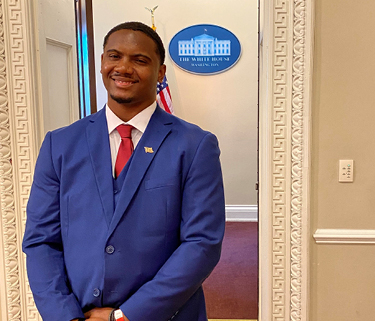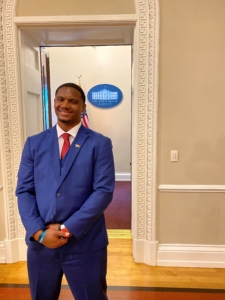Amicus Brief Filed in U.S. Supreme Court Case Emphasizes Importance of Testers to ADA Enforcement
If testers are stripped of standing, the result will be less private enforcement of the ADA, a less accessible society, and the continued exclusion of people with disabilities from community life.
Washington, DC – Eighteen leading disability advocacy organizations have filed a “friend-of-the-court” brief in the U.S. Supreme Court in Acheson Hotels v. Laufer, a case that will decide whether testers—disabled people who investigate compliance with the Americans with Disabilities Act (ADA)—have the ability to sue businesses for discrimination when their rights under that law are violated. The case is scheduled to be heard on October 4, 2023.
Civil rights testing—intentionally investigating and challenging discrimination—has been used as an effective tool of enforcement since the 1950s, helping ensure that public accommodations were integrated and housing discrimination, challenged. Congress included the same enforcement tools when it passed the ADA in 1990 that it had included in these earlier civil rights laws, and testing has proven to be an essential enforcement tool in this context as well.
Deborah Laufer is one such tester. She is a person with disabilities who has filed numerous cases against hotels for violating an ADA regulation that requires hotels to include certain information about accessibility features in their online reservation systems. Ms. Laufer is a “tester” in her cases because she voluntarily puts herself in a situation to experience discrimination—specifically, she visits hotel websites to investigate compliance with the reservation rule—and when denied the information to which the ADA regulations entitle her, she challenges that discrimination in court and seeks to make the hotels comply with the law.
Despite acknowledging that they were, in fact, violating the ADA, hotelier Acheson doesn’t think that tester standing is fair, and argues that people like Ms. Laufer should have an immediate plan to stay at a hotel before they can challenge the hotel’s discrimination. Acheson asks the Supreme Court to reverse a First Circuit opinion upholding discrimination claims brought against them by Ms. Laufer as a tester.
The brief of amici opposes Acheson’s request and defends testing as essential to the enforcement of the ADA, arguing that eliminating tester standing would frustrate the ADA’s goal of equality of opportunity. Amici discuss how the indignity of unequal treatment has long been recognized as the sort of harm that can be remedied in court and explains how an individual’s motive, or status as a tester, does not change that. Amici also dispel a number of false claims made by Acheson and its supporters about ADA litigation.
“People with disabilities face rampant inaccessibility and discrimination that impacts every aspect of their lives—from travel to employment to health care and everything in between,” said Shira Wakschlag, Senior Director of Legal Advocacy & General Counsel at The Arc of the United States. “Despite the ADA’s promise to create equal access, insufficient oversight and enforcement means that businesses frequently ignore the civil rights of disabled people, making their daily lives extremely difficult and undermining the rights guaranteed by the law. ADA testers are essential to ensuring the rights of people with disabilities are enforced and protected and that the full promise of the ADA is realized.”
“If individuals with the fortitude to take on the burden of ADA litigation as testers are stripped of standing, the result will inevitably be less enforcement of the ADA, frustration of its goals, and the continued exclusion of people with disabilities from community life,” said Michelle Uzeta, Deputy Legal Director at the Disability Rights Education and Defense Fund.
“Given that the ADA was signed into law more than 30 years ago and thousands of businesses remain inaccessible to people with disabilities, it is critically important the Supreme Court affirms the ability of testers to investigate compliance,” said Marlene Sallo, Executive Director of the National Disability Rights Network. “Testers ensure that travelers with disabilities do not discover their hotel is inaccessible when they show up at the door.”
“By the time a disabled person attempts to patronize a noncompliant public accommodation, it’s too late for a lawsuit to be much use,” added Amy Robertson, Counsel for Amici at Fox and Robertson, PC. “Systemic investigation by those protected by the ADA can accelerate society’s progress toward a time when they and others can go about their daily lives expecting—and attaining—access to a wide range of facilities and services.”
Amici are represented by attorneys Karla Gilbride, Amy Robertson of Fox & Robertson, PC, Justin Ormand of Allen and Overy LLP, Thomas Zito of Disability Rights Advocates, and Michelle Uzeta of Disability Rights Education and Defense Fund.
###
About The Arc of the United States: The Arc advocates for and serves people with intellectual and developmental disabilities (IDD), including Down syndrome, autism, Fetal Alcohol Spectrum Disorders, cerebral palsy, and other diagnoses. Founded in 1950 by parents who believed their children with IDD deserved more, The Arc is now a network of nearly 600 chapters across the country promoting and protecting the human rights of people with IDD and actively supporting their full inclusion and participation in the community throughout their lifetimes. Through the decades, The Arc has been at the forefront of advances in disability rights and supports. Visit thearcwebdev.wpengine.com or follow us @TheArcUS to learn more. Editor’s Note: The Arc is not an acronym; always refer to us as The Arc, not The ARC and never ARC. The Arc should be considered as a title or a phrase.
About Disability Rights Education & Defense Fund: The Disability Rights Education & Defense Fund (DREDF) is a national, nonprofit law and policy center led by people with disabilities and dedicated to advancing and protecting the civil and human rights of disabled people. Founded in 1979 by people with disabilities and parents of children with disabilities, DREDF remains board- and staff-led by members of the communities for whom it advocates.
About National Disability Rights Network: The National Disability Rights Network works in Washington, DC on behalf of the Protection and Advocacy Systems (P&As) and Client Assistance Programs (CAPs), the nation’s largest providers of legal advocacy services for people with disabilities.
Media Contacts:
Jackie Dilworth, The Arc, dilworth@thearcwebdev.wpengine.com
Tina Pinedo, DREDF, tpinedo@dredf.org
David Card, National Disability Rights Network, press@ndrn.org










